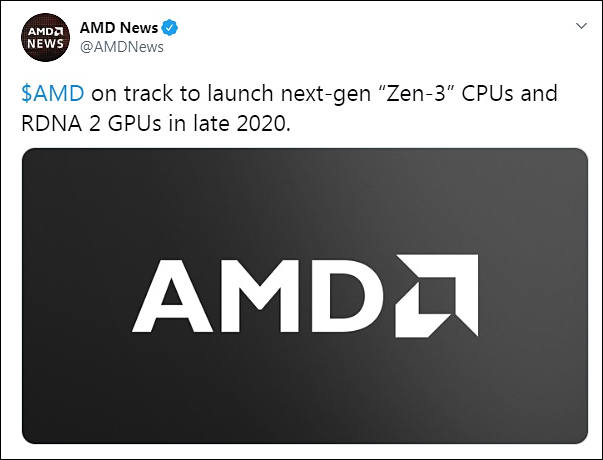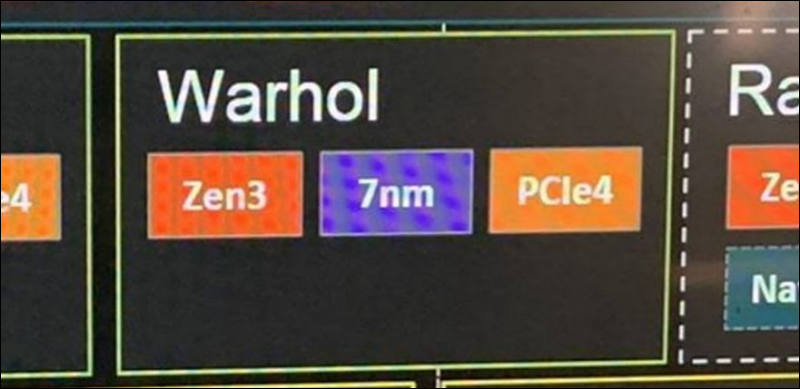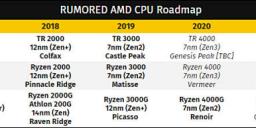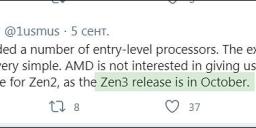
It allows to keep PV going, with more focus towards AI, but keeping be one of the few truly independent places.
-
First unofficial 2020 roadmap surfaced
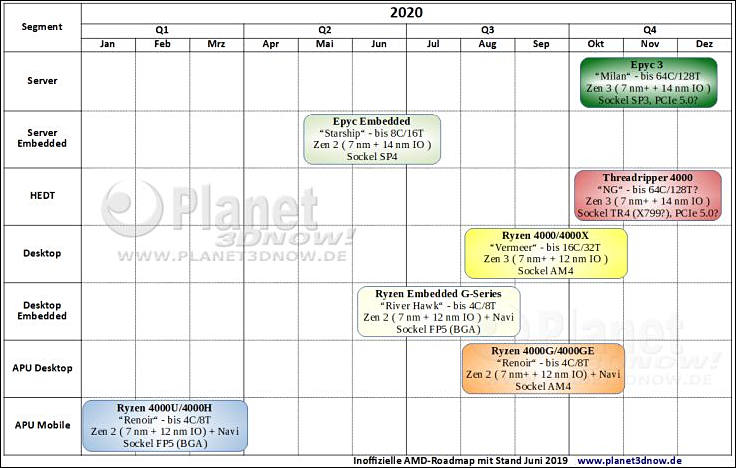
Some very early leaks and predictions:
- 7nm+ process, mostly to make products cheaper by using EUV on some parts
- around +100Mhz frequency rise on average, +200Mhz stock for top models
- 1-3% IPC progress
- DDR4 memory controller must stay same as in Zen 2
- Possible DDR5 controller for premium x670 boards
- 8 core price is expected to drop to $199
- 16 core to $499

 sa8765.jpg736 x 468 - 62K
sa8765.jpg736 x 468 - 62K -
AMD made special controlled leak considering Zen 3 chiplets
- Number of cores and general architecture will be kept the same
- Progress will slow down a lot with around 2-5% real performance increase compared to current gen
- Main marketing trick will be 4 way SMT per one core. Such thing is efficient only is certain tasks.
- For some software due to SMT we will actually see drop in performance as each virtual core will have less real resources
-
AMD's Zen 3 architecture is set to launch next year and if this rumor pans out it will bring no less than 8% greater performance per clock vs current Ryzen 3000 series processors.
Early Zen 3 engineering samples are able to operate at roughly 200Mhz higher clock speeds compared with the company's early Zen 2 engineering samples
Reality will be such - 2-4% IPC increase, may be another 3-4% from shared cache in benchmarks.
Same frequencies, except 1-2 top models that will cost around 30% extra for 100-200Mhz premium. -
New rumors update.
AMD plans to shift Ryzen 3 to Q4 of 2020, can happen that even to Q1 of 2021.
Main reason being TSMC issues with 7nm process and not enough speed of pumping up even original 7nm.
EUV 7nm is very questionable, you can see unfounded claims of 20% density improvement, but rumors are that it will be focused on mobile chips and won't bring anything good for desktop chips, and can come even with degraded top frequencies and worst thermal issues.
AMD will also release new Х670 chipset with price being +30% compared to x570 (that is extremely expensive).
-
x670 chipset can be again outsourced to ASMedia, as AMD seems unable to make anything good.
x570 has lot of issues, horrible heat management, plus AMD matched it's price to reach Zen profits (I mean >300%).
Only improvements will be upgrade of all lines provided by chipset to PCIe 4.0 lines.
Chipset also will have config allowing to set it to 8 PCIe lines connection to CPU for usage in new TRX Threadripper boards (same way now remarked x570 is used for such).
-
New rumors propose correct 100-200Mhz gain (at best!)
But absolutely idiotic +17% IPC.
Of course, AMD will do everything to properly select tests and use such that will get good gain from new cache size and architecture.
But real IPC won't change much.
-
Another rumors suggest that AMD abandoned or disabled SMT4 in Zen 3, despite original plans.
This happened due to thermal issues it caused.
-
in mixed operations that leverage both integer and floating-point units of the Zen architecture, Zen 3 could deliver a 17% IPC gain on average. It is also stated that the integer ops are getting a 10-12% increase on average while the floating-point operations could feature up to a 50% increase in performance.
Again this same +17% rumor. +17% will be only in special benchmarks that AMD will prepare for reviewers (ones that do not use DRAM and will use more cache then Zen 2 has).
-
AMD has promised that its Zen 3 architecture be introduced later this year, while consumer CPUs powered by the Zen 3 architecture will arrive in March 2021.
Rumors are that it is huge issues with 7nm+, partially EUV, process at TSMC.
Most probably resources will be rerouted to usual 5nm specially for Apple and all other products will be postponed.
-
Many have suggested that Zen 3 would deliver higher IPC gains than Zen 2 (based on what AMD has said) and would feature greater than 32 MB of L3 cache per compute die (based on the aforementioned leaked presentation). Some of my sources have suggested a 20% IPC bump, but according to our new leak the IPC gain is only 10-15% on a single thread, just on par with Zen 2. This IPC improvement comes largely from a reworked front end. IPC could improve in multi threading, however, as Zen 3 will benefit from the improved CCX.
Additionally, Zen 3 will double the L3 cache per CCX, but since there is now only 1 CCX per compute die instead of 2, the level of L3 cache remains the same at 32 MB. Unfortunately, there will be no 48 MB or 64 MB L3 caches with Zen 3, which I’m sure is disappointing for some.
https://adoredtv.com/exclusive-zen-3-to-feature-10-15-increased-ipc-32-mb-of-l3-cache-per-ccx/
-
AMD disclosed that its upcoming "Zen 3" 4th generation Ryzen desktop processors will only support AMD 500-series (or later) chipsets. The next-gen processors will not work with older 400-series or 300-series chipsets. This comes as a blow to those who bought premium X470 motherboards hoping for latest CPU compatibility running into 2020.
AMD is now behaving exactly like Intel.
-

Remove this private property owners and "efficient management" and you will never have such.

 sa13024.jpg800 x 140 - 20K
sa13024.jpg800 x 140 - 20K -
AMD backpedalled to support this CPUs on 4xx series MB, but specially used it as trick to avoid making support on 3xx series.
We recently announced that we would not support “Zen 3” on AMD 400 Series motherboards due to serious constraints in SPI ROM capacities in most of the AMD 400 Series motherboards. This is not the first time a technical hurdle has come up with Socket AM4 given the longevity of this socket, but it is the first time our enthusiasts have faced such a hurdle.
Over the past week, we closely reviewed your feedback on that news: we watched every video, read every comment and saw every Tweet. We hear that many of you hoped for a longer upgrade path. We hear your hope that AMD B450 and X470 chipsets would carry you into the “Zen 3” era.
Our experience has been that large-scale BIOS upgrades can be difficult and confusing especially as processors come on and off the support lists. As the community of Socket AM4 customers has grown over the past three years, our intention was to take a path forward that provides the safest upgrade experience for the largest number of users. However, we hear you loud and clear when you tell us you would like to see B450 or X470 boards extended to the next generation “Zen 3” products.
As the team weighed your feedback against the technical challenges we face, we decided to change course. As a result, we will enable an upgrade path for B450 and X470 customers that adds support for next-gen AMD Ryzen™ Processors with the “Zen 3” architecture. This decision is very fresh, but here is a first look at how the upgrade path is expected to work for customers of these motherboards.
We will develop and enable our motherboard partners with the code to support “Zen 3”-based processors in select beta BIOSes for AMD B450 and X470 motherboards.
These optional BIOS updates will disable support for many existing AMD Ryzen™ Desktop Processor models to make the necessary ROM space available.
The select beta BIOSes will enable a one-way upgrade path for AMD Ryzen Processors with “Zen 3,” coming later this year. Flashing back to an older BIOS version will not be supported.
To reduce the potential for confusion, our intent is to offer BIOS download only to verified customers of 400 Series motherboards who have purchased a new desktop processor with “Zen 3” inside. This will help us ensure that customers have a bootable processor on-hand after the BIOS flash, minimizing the risk a user could get caught in a no-boot situation.
Timing and availability of the BIOS updates will vary and may not immediately coincide with the availability of the first “Zen 3”-based processors.
This is the final pathway AMD can enable for 400 Series motherboards to add new CPU support. CPU releases beyond “Zen 3” will require a newer motherboard.
AMD continues to recommend that customers choose an AMD 500 Series motherboard for the best performance and features with our new CPUs.
-
Some unusual statements that can be result of Huawei band
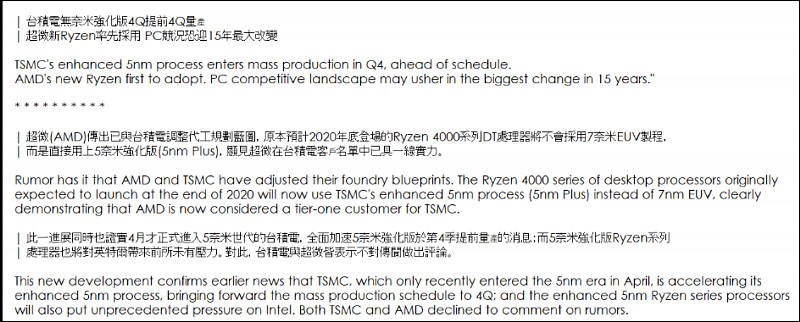
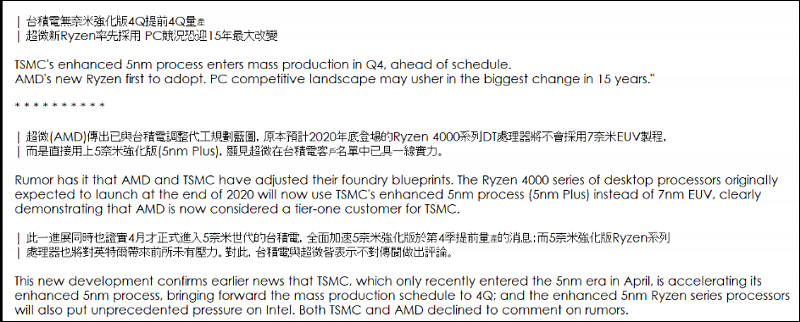
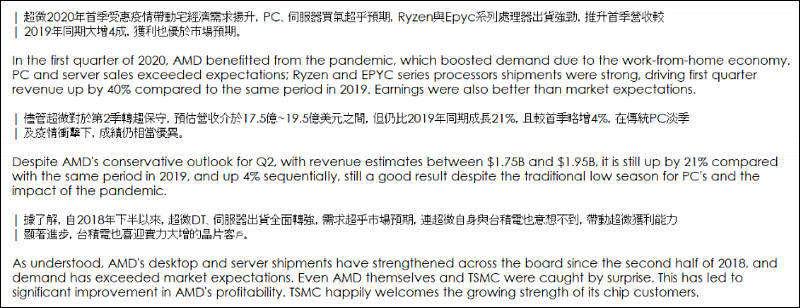
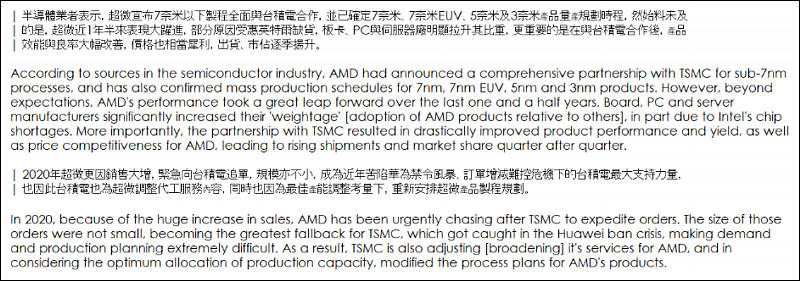
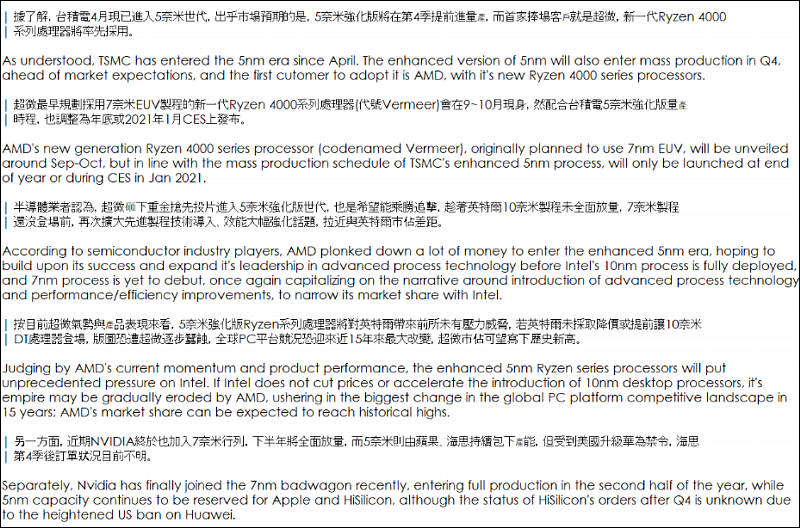

 sa13258.jpg800 x 322 - 72K
sa13258.jpg800 x 322 - 72K
 sa13259.jpg800 x 322 - 72K
sa13259.jpg800 x 322 - 72K
 sa13260.jpg800 x 308 - 78K
sa13260.jpg800 x 308 - 78K
 sa13261.jpg800 x 281 - 85K
sa13261.jpg800 x 281 - 85K
 sa13262.jpg800 x 528 - 132K
sa13262.jpg800 x 528 - 132K -
Digitimes, VideoCardz, and RetiredEngineer (twitter) started an intriguing rumor that Ryzen 4000 might end up at 5nm+. Asking around at a reliable place, we have to disappoint some of you as this won't be the case. The Ryzen 4000 series based on Zen 3 core is still at 7nm.
As expected 5nm thing had been idiotic TSMC PR move. As it seems that they don't have 5nm suitable for high powered chips at all now. And wanted to make info clouds for US to make it look that existing 5nm will be suitable for their needs.
-
AMD in an official briefing call with us confirmed that the company's "Zen 3" client processors are on-track for launch within 2020. This refutes rumors that "Zen 3" based Ryzen processors had been delayed to 2021 in favor of giving the upcoming Ryzen 3000XT reign over the rest of the year. The call was chaired by AMD's client-segment product managers who were speaking purely in context of their product segment, which is how we deduce that they were referring to "Vermeer" and not [just] "Milan." They were responding to speculation that "Zen 3" has been delayed to 2021, forcing AMD to refresh its existing IP.
In the call, AMD told us that the information about "Zen 3" launching in 2020 is not under embargo, and so here we are. An AMD spokesperson told us that "the rumor on Zen 3 delay is inaccurate." AMD recently also refuted rumors of "Zen 3" being based on 5 nm, by putting out microarchitecture roadmap slides on the occasion of a recent investor relations event, which reaffirmed "Zen 3" as a 7 nm-class microarchitecture.
Back on track.
-
New propaganda from Adored TV
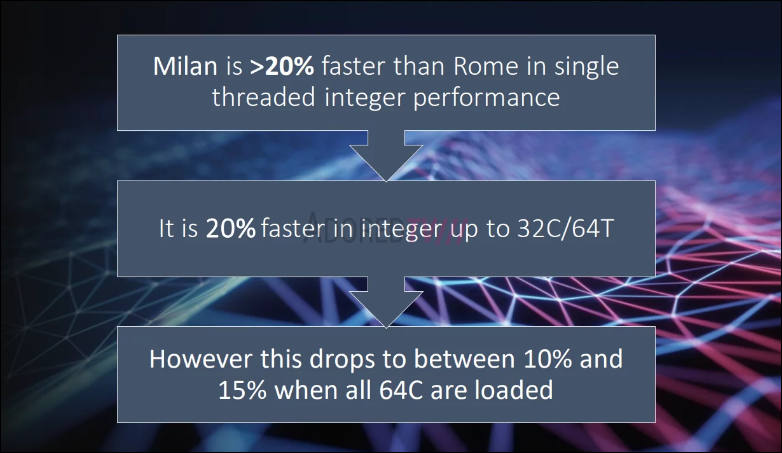
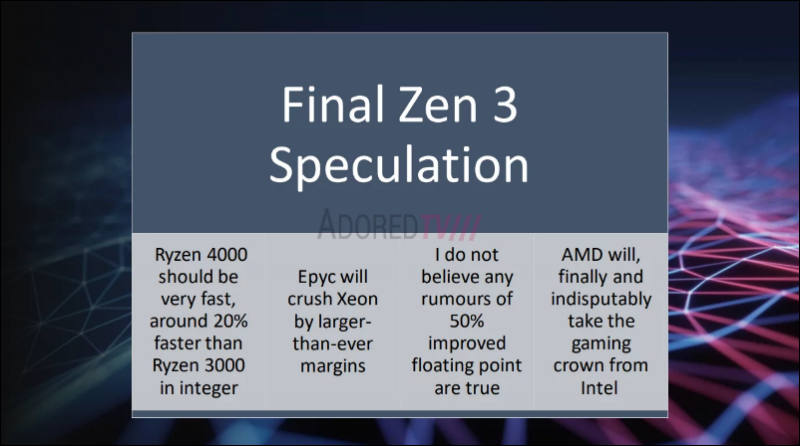
Note that their claims about Zen 2 had been mostly bullshit (I mean performance gains and frequencies).
Here also note that they do not focus on performance per clock.
To get big integer performance advantage they need revolutionary architecture changes.
And note that they are not changing 7nm process much.
Idea of banchamrks can be making special ones that heavily depend on RAM throughput, so making good progress in this regard and comparing you can get needed numbers.

 sa13771.jpg782 x 453 - 53K
sa13771.jpg782 x 453 - 53K
 sa13772.jpg800 x 446 - 47K
sa13772.jpg800 x 446 - 47K -
AMD might in fact skip desktop 4000 series in favor of 5000.
This can make a lot of sense, as the current 4000 series lineup is extremely misleading.
AMD already introduced the series with Renoir-based Ryzen 4000U and Ryzen 4000H models.
-
Igor Wallossek's on AMD upcoming Vermeer processor series based on Zen3 architecture.The new information is for the clock speeds, which were decoded from an OPN code Igor was given by the source:
OPN CODE
100-000000059-52_ 48/35 _ Y
The 48 stands for 4.8 GHz boost clock, while 35 means 3.5 GHz base clock. It is still not the final sample, but definitely a faster stepping from the previous report. In June Igor covered first data on the B0 samples which were featuring a boost clock of 4.6 GHz and a base clock of 3.7 GHz.
100-000000059-14_46/37_Y
100-000000059-15_46/37_NEngineering samples mentioned are of course 16 cores and 32 thread CPUs, successors to Ryzen 9 3950X. The new OPN code means that the Vermeer sample is running 100 MHz higher on boost clock compared to 3950X, while the base clock has the same frequency.
Present leaks suggest that benchmarks that use all 16 cores will hsow only 3-7% performance increase comapred to same CPU in Zen 2 lineup.
Thermal constraints no longer allow AMD to increase performance as had been planned.
None of released CPUs will be overclockable (if you do not count extreme nitrogen and such).
-
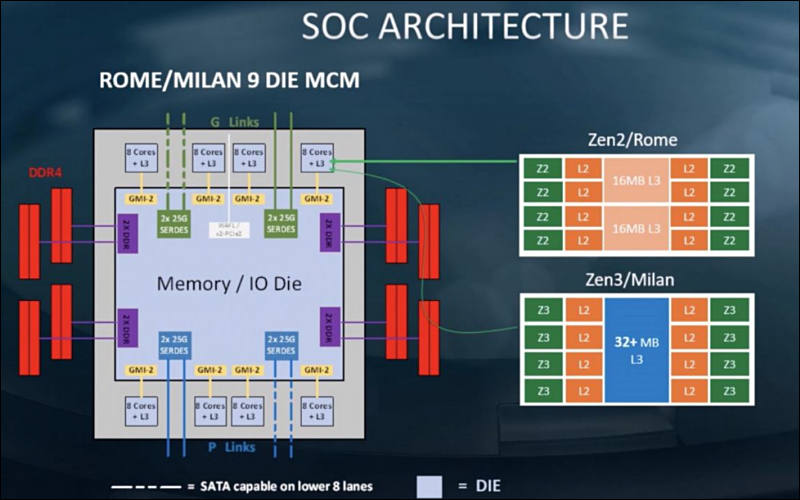
IPC performance increase will be up to + 15% for integer workloads. For EPYC processors with up to 32 cores, AMD wants to achieve a performance increase of + 20% compared to the Rome processors with Zen 2 cores - the single-treaded performance should also increase by + 20%. For the larger EPYC processors with up to 64 cores, AMD expects a performance increase of around 10 to 15%. Apparently, AMD can achieve a higher clock rate for processors with fewer cores, so that the performance increase has a correspondingly higher effect with fewer cores.
Threadripper and Epyc socket will change from Zen 4
With Genoa, AMD is switching from the SP3 to the SP5 platform. The nominal thermal design power ranges from 120 to 240 W, although there are already special models that allow themselves more than 225 W (official TDP limit for normal models). The TDP increases slightly towards the top. AMD gives up platform compatibility with Genoa after three generations. However, due to the use of DDR5 and PCI-Express 5.0 as well as other functions, AMD has no other choice at this point.

 sa14239.jpg800 x 500 - 62K
sa14239.jpg800 x 500 - 62K -
New info tells about 10 core model in lineup
Two chiplet versions will be
- 10 cores, with 6 cores intentionally disabled
- 12 cores, with 4 cores intentionally disabled
- 14 cores, AMD thinking on such version also
- 16 cores, all cores are not disabled by special laser
According to rumors for present TSMC 7nm process and small chiplet size usually 85-90% of chiplets have all 8 cores working and 98% have at least 6 out of 8 working. So, almost all 10 core CPUs and most of 12 core ones are being made by disabling perfectly working cores, just out of marketing purposes.
Howdy, Stranger!
It looks like you're new here. If you want to get involved, click one of these buttons!
Categories
- Topics List23,997
- Blog5,725
- General and News1,359
- Hacks and Patches1,153
- ↳ Top Settings33
- ↳ Beginners256
- ↳ Archives402
- ↳ Hacks News and Development56
- Cameras2,367
- ↳ Panasonic995
- ↳ Canon118
- ↳ Sony156
- ↳ Nikon96
- ↳ Pentax and Samsung70
- ↳ Olympus and Fujifilm101
- ↳ Compacts and Camcorders300
- ↳ Smartphones for video97
- ↳ Pro Video Cameras191
- ↳ BlackMagic and other raw cameras116
- Skill1,960
- ↳ Business and distribution66
- ↳ Preparation, scripts and legal38
- ↳ Art149
- ↳ Import, Convert, Exporting291
- ↳ Editors191
- ↳ Effects and stunts115
- ↳ Color grading197
- ↳ Sound and Music280
- ↳ Lighting96
- ↳ Software and storage tips266
- Gear5,420
- ↳ Filters, Adapters, Matte boxes344
- ↳ Lenses1,582
- ↳ Follow focus and gears93
- ↳ Sound499
- ↳ Lighting gear314
- ↳ Camera movement230
- ↳ Gimbals and copters302
- ↳ Rigs and related stuff273
- ↳ Power solutions83
- ↳ Monitors and viewfinders340
- ↳ Tripods and fluid heads139
- ↳ Storage286
- ↳ Computers and studio gear560
- ↳ VR and 3D248
- Showcase1,859
- Marketplace2,834
- Offtopic1,320


